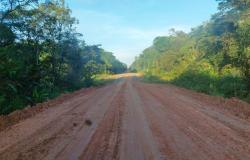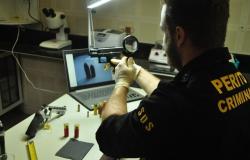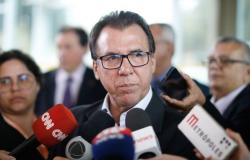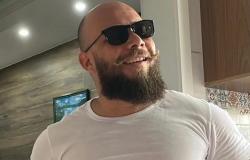April 2, 2024 – 09:12
autism ableism awareness World Autism Awareness Day people with disabilities SEDIH
Larissa Falcão – Ascom Casa Civil – Text
Hiane Braun – Civil House – Photos
Yuri Leonardo – Civil House – Infographic
Rosane Gurgel – Video
This April 2nd, World Autism Awareness Day, the biggest challenge is for society to break the barrier of ableism and for education to not only train workers, but citizens
History teacher and public manager Lucas Maia, aged 34, chose education as a path to connect more easily with people. According to him, socialization was difficult since childhood. “As soon as I graduated, I joined Fundação Casa da Esperança, an institution providing specialized educational services aimed at people with disabilities. There, I identified with autistic students, and went after my diagnosis. Luckily, I worked in contact with professionals experienced with adults, experienced with late diagnosis, and I had this opportunity,” he details.
In 2017, at the age of 27, Lucas was diagnosed with Autism Spectrum Disorder [TEA] at support level 1. The new moment in his personal journey engaged him in building a society without ableism. “This is related to infantilization, or the idea that people with disabilities are poor people; someone who is receiving divine punishment. People with disabilities are citizens who have all the rights and should have access to all the spaces that other people have, and this can be achieved with reasonable adaptations”, he explains.
In 2020, Lucas became a member of the Brazilian Association for Action for the Rights of Autistic People (Abraça) and, later, a member of the State Council for People with Disabilities, eventually being elected president of the collegiate. He is currently coordinator of Public Policies for People with Disabilities, a coordination linked to the State Secretariat for Human Rights (Sedih), created in 2023.
“I feel this responsibility. Therefore, I use the sunflower cord, which is a symbol provided for by law as an indication of a hidden disability, which is not immediately visible. I try to remember to wear this lanyard every day just to remind anyone around me of my condition. Autism has no face, so part of how I try to face this responsibility is to always present myself as a person with a disability”, he points out.
“Autism has no face”
Autism, according to the Diagnostic and Statistical Manual of Mental Disorders (DSM-V), is a neurodevelopmental disorder characterized by difficulties presented at some level in communication, language and social interaction. According to the Ministry of Health, signs can be noticed in the first months of a child’s life, and the diagnosis is defined around 2 or 3 years of age. The diagnosis, in turn, is clinical and must be made by a multidisciplinary team.
The pediatric neurogeneticist at Albert Sabin Children’s Hospital (Hias), linked to the Ceará Health Department (Sesa), André Pessoa, details ASD. “There are different levels of ASD. Support grade 1 would be the theoretically lightest forms, with a slightly lower demand. Forms of support 2 and 3 are where the demand is greatest, for care, activities of daily living, communication, in general”.
The lack of recent data prevents us from knowing more current information about this section of the population. According to a survey by the World Health Organization (WHO), released in 2010, in Brazil, there are two million autistic people. However, diagnoses in children, young people and adults have increased in recent years.
According to André Pessoa, early and accurate diagnosis is important both in preventing factors that may further hinder the child’s development, one of them being exposure to screens, as well as referral to therapies, which is a modifiable factor. “Access to therapies is what has the biggest impact on improving the prognosis of these children. In its functional evolution, of social, behavioral, even intellectual language”, he argues.
In the public health network of Ceará, autistic children and adolescents have specialized care offered by the Child and Adolescent Care Center (Naia) of the Professor Frota Pinto Mental Health Hospital (HSM), part of the Sesa Network. For adults, the Government of Ceará opened, at the beginning of 2024, the autism clinic for adults, also at HSM. The outpatient clinic is a pioneer in the public network in Ceará, and has specialized professionals including psychologists and psychiatrists.
Inclusive culture
Autism is not a disease, but a disorder understood as a disability. According to the Brazilian Inclusion Law, a person with a disability is one who has a long-term impairment of a physical, mental, intellectual or sensory nature, which, in interaction with one or more barriers, can obstruct their full and effective participation in the society in which they live. equal conditions with other people.
Lucas argues that the role of public authorities, and also of society, is to eliminate barriers, which can be physical, communicational and attitudinal, which are behaviors and prejudices that people may have. “I prefer to talk about structural ableism in our culture, because the attitudinal barrier creates an illusion that is very easy to break down. But it is not easy. This is ableism, which is specific prejudice against people with disabilities. We have to question and deconstruct to bring this equality of opportunities”, he points out.

In this sense, the Coordination works to enable this transformation through public policies, in a decentralized and transversal way. “We are in this dialogue bringing our agendas, ensuring that our policy is covered by all Secretariats. The interesting thing about the Human Rights Secretariat is that it makes our policy transversal. In other words, all other Departments must be aware of current legislation on people with disabilities as well”, he adds.
Transversality in public management means that a topic can be addressed between different departments (public bodies), facilitating knowledge, resources and techniques to be brought together in cooperative work. Regarding this, Lucas highlights the role of education.
“Education is fundamental in the sense of having education not only to prepare workers, but as a training of citizens. We have current legislation that guarantees that people with disabilities at school age must be in the same class as other children. When children with and without disabilities live together, we teach them how to live in a plural and diverse society. This ensures that these children learn to recognize these people with disabilities as their peers; with the appropriate adaptations, they can be on an equal footing with everyone,” she adds.

Another important change was being able to form a team in the Coordination, primarily with people with disabilities. “We prioritize people with disabilities, talking about their policies and demands, bringing our perspective to the debate. There is always a demand for greater access to the recognition of our humanity. This is also the cool thing about being at the Human Rights Secretariat”, he concludes.
Tags: Lucas Maia autistic teacher manager works guarantee rights people disabilities ableism
--








